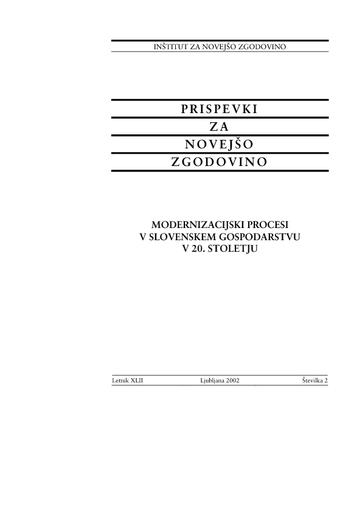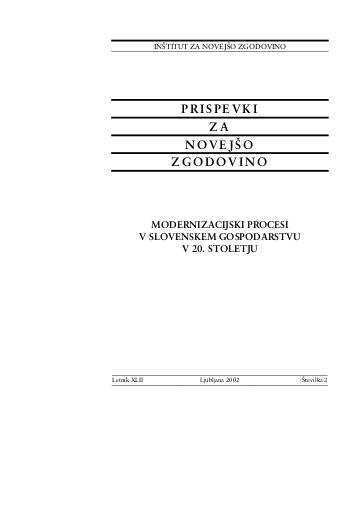
/
Periodicals
/
Prispevki za novejšo zgodovino
The Economic Role of Austro-Hungarian Monarchy in the European Area in the Context of Modernization Processes and the Situation of Individual Lands

Author(s):Andrej Pančur
Co-author(s):Jasna Fischer (odg. ur.)
Leto:2002
Publisher(s):Inštitut za novejšo zgodovino, Ljubljana
Language(s):slovenščina
Type(s) of material:text
Keywords:Avstro-Ogrska, habsburška monarhija, gospodarski razvoj, gospodarska rast, razvojna politika, razvojne razlike, industrializacija, Austro-Hungary, Habsburg monarchy, economic development, economic growth, development policy, development disparities, industrialization
Rights:

This work by Andrej Pančur is licensed under Creative Commons Attribution-NonCommercial-NoDerivs 4.0 International
Files (1)

Name:Prispevki_za_novejso_zgodovino_2002_2.pdf
Size:1.36MB
Format:application/pdf
Permanent link:https://hdl.handle.net/11686/file227
Description
In terms of economic development, the Austro-Hungarian monarchy lied at the crossroads of the more developed western and northern parts of Europe and the less developed southern and eastern parts of Europe. This was also clearly reflected in the levels of development within the Austro-Hungarian monarchy. The more industrialized the lands, the more developed they were. The development lags could only start to narrow when also less developed lands had started with a more intensive process of industrialization. On the basis of the comparison of a successful economic development of Hungary and unsuccessful economic development of Galicia and Dalmatia, the author concludes that only the lands which increased the importance of commerce in economy and become part of the process of globalization could eventually succeed. The role of the state in this was to build an efficient transport and financial infrastructure and to provide for stable fiscal and monetary systems.
Metadata (12)
- identifierhttps://hdl.handle.net/11686/1712
- title
- Ekonomska vloga Avstro-Ogrske v evropskem prostoru s stališča modernizacijskih procesov in položaj posameznih dežel v njej
- The Economic Role of Austro-Hungarian Monarchy in the European Area in the Context of Modernization Processes and the Situation of Individual Lands
- creator
- Andrej Pančur
- contributor
- Jasna Fischer (odg. ur.)
- subject
- Avstro-Ogrska
- habsburška monarhija
- gospodarski razvoj
- gospodarska rast
- razvojna politika
- razvojne razlike
- industrializacija
- Austro-Hungary
- Habsburg monarchy
- economic development
- economic growth
- development policy
- development disparities
- industrialization
- description
- In terms of economic development, the Austro-Hungarian monarchy lied at the crossroads of the more developed western and northern parts of Europe and the less developed southern and eastern parts of Europe. This was also clearly reflected in the levels of development within the Austro-Hungarian monarchy. The more industrialized the lands, the more developed they were. The development lags could only start to narrow when also less developed lands had started with a more intensive process of industrialization. On the basis of the comparison of a successful economic development of Hungary and unsuccessful economic development of Galicia and Dalmatia, the author concludes that only the lands which increased the importance of commerce in economy and become part of the process of globalization could eventually succeed. The role of the state in this was to build an efficient transport and financial infrastructure and to provide for stable fiscal and monetary systems.
- Glede na gospodarsko razvitost je bila Avstro-Ogrska prehodno območje med bolj razvitim zahodom in severom in manj razvitim jugom in vzhodom. Ta razvojna prelomnica se je jasno odražala tudi znotraj Avstro-Ogrske. Čim bolj industrializirane so bile posamezne dežele, tem bolj so bile razvite in obratno. Razvojne razlike so se zato lahko začele zmanjševati, ko so se začele intenzivno industrializirati tudi manj razvite dežele. Na podlagi primerjave uspešnega gospodarskega razvoja Ogrske in neuspešnega gospodarskega razvoja Galicije in Dalmacije avtor ugotovi, da so bile lahko uspešne samo dežele, ki jim je uspelo učinkovito komercializirati gospodarstvo in se intenzivno vključiti v proces globalizacije. Država je pri tem predvsem morala pomagati zgraditi učinkovito prometno in finančno infrastrukturo in zagotoviti stabilen fiskalni in denarni sistem.
- publisher
- Inštitut za novejšo zgodovino
- date
- 2002
- type
- besedilo
- language
- Slovenščina
- isPartOf
- rights
- license: ccByNcNd
Citirano v (1)
| Tipologija | Avtor(ji) | Naslov | Kraj | Založba | Leto |
|---|---|---|---|---|---|
| 1.01 Izvirni znanstveni članek | Smiljanić, Ivan | "Bil je konkurz prava katastrofa" : stečajni postopki pred Deželnim sodiščem v Ljubljani med letoma 1900 in 1918 | Ljubljana | Inštitut za novejšo zgodovino | 2020 |